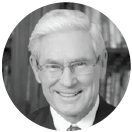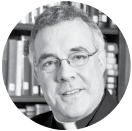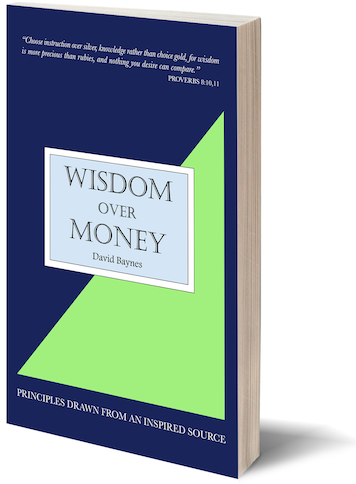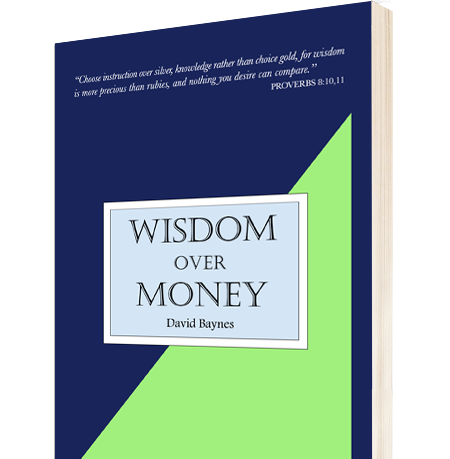Praise for Wisdom Over Money

“David Baynes conveniently lays before us fifty-two insightful and thought provoking reflections on the Biblical perspective on money. Read them all! Then go back and focus on one a week for the next year. The experience will be a powerful antidote to the tsunami of materialism that each of us face on a daily basis.”

“God’s wisdom has three characteristics; it is always right, it is always relevant, and it is never going to change. This book will point you to all that you need to know about managing money and, in essence, your life. I recommend Wisdom Over Money with great pleasure.”

“David Baynes is the rare individual who understands both pragmatic financial principles and the eternal Word of God. He writes from a pastor’s heart, eager to share knowledge and experience for our benefit. Each of his fifty-two chapters provides valuable lessons. We are made richer by their application.”

“David Baynes is a humble servant whose life aligns with the lines that he writes. His observations about wisdom – especially as it pertains to financial health and stewardship – are clear, concise and imminently practical. They are also desperately needed! If you take them to heart they will take your heart to a place of increased blessing!”

“Wisdom Over Money is a reminder that our opportunities to be a steward over our resources is best served by holiness. . . . When God is given the glory in all things first, only then are we made whole and transformed by what we earn or give. David Baynes’ book promotes a wealth of spiritual insight.”

“David Baynes has done a thoughtful job of reflecting on the mandates that will challenge all of us to grow in our personal and professional lives.”
Available in paperback and ebook.
buy the bookPractical insights on 52 topics, such as . . .
Discerning the best
Some choices are better than others. Are you a careful decision maker? How do you evaluate the options before you?
Does faith produce prosperity?
Can God be depended on to always bless with material wealth those who are faithful and generous toward him?
Make today your "Someday"
How will you recognize the “someday” when you will act on your good intentions? What are the conditions you are waiting to see aligned?
Did Jesus despise the rich?
When the rich are not being envied they are often vilified and hated. Jesus described the poor as “blessed.” How did he regard the rich?
Rich and Virtuous: Is it possible?
Are any of the wealthy you know not greedy, selfish, dishonest, or abusive of others? Must virtue be sacrificed on the way to attaining wealth?
The key to financial freedom
What will it take for you to experience financial freedom? Do you see it as a realistic possibility? You may be surprised to learn this key.
Chapter Previews
Select a chapter below to read an excerpt from Wisdom Over Money.
Chapter 1
Acquire Wisdom Before Experience
The proverbs of Solomon . . . for attaining wisdom and discipline; for understanding words of insight; for acquiring a disciplined and prudent life . . . — Proverbs 1:1-6
There is a difference between knowledge and wisdom. Knowledge consists of accumulated facts and information. Wisdom is described as the meeting of knowledge and experience which yields insight. It may be true that the most trusted insights are derived by personal experience. But if experience is the only available way to derive wisdom, it exacts a high cost—the painful outcomes of some ill-fated (foolish) choices.
Did you have to drop out of school before you were convinced that it is wise to get an education? Did you have to suffer a horrific accident before concluding that it is wise to refrain from texting while driving? Did you have to suffer the pain of bankruptcy, repossession, or foreclosure before you gained insight into the safe and appropriate use of credit? For most of us, life is too short and our world of experience too limited for us to acquire sufficient wisdom through experience alone. Unless we can derive wisdom from other sources, we are doomed to suffer much calamity, loss, and regret.
The argument of the Bible (and many other sources of counsel) is that wisdom can be shared. Insights can be communicated as proverbs, parables, and testimonies. We can gain wisdom helpful to us by paying attention to O.P.E.—other people’s experience. King Solomon, wise beyond compare in his day, recorded many proverbs, not to prove himself or prop up his personal reputation, but so that others might attain wisdom and be guided to “a disciplined and prudent life” (Proverbs 1:2, 3). Jesus concluded his sermon on the mount by saying, “Everyone who hears these words of mine and puts them into practice is like a wise man who builds his house on a rock” (Matthew 7:24). The premise is clear. Solomon recorded proverbs and Jesus taught with the desire to impart wisdom. Their efforts provide a shortcut—a way to gain wisdom without suffering the consequences of choices made from ignorance, immaturity, or inexperience.
. . .
Chapter 2
Wishes are not Resolutions
A sluggard does not plow in season; so at harvest time he looks but finds nothing. —Proverbs 20:4
In everything that he under-took . . . [Hezekiah] sought his God and worked wholeheartedly, and so he prospered. —2 Chronicles 31:21
At the beginning of a new year, you may have some resolutions in mind, even if you do not write them down. You may also have some wishes about what the new year may hold. Do not make the mistake of confusing the two. There is a difference between resolutions and wishes, would you agree? Understanding the difference may be key to seeing both come to pass.
A resolution is a firm decision to do, or not to do, something. A wish is a desire or longing for something that cannot, or probably will not, happen. Perhaps the biggest difference between the two is in the area of control. Resolutions pertain to actions that I can choose. Wishes pertain to outcomes that I may be able to influence, but I cannot determine. I may wish that my favorite NFL team wins the Super Bowl, but I do not have the power to make it happen.
How does that work out with regard to money? You may want to make 25% more money in the new year. Is that a resolution or a wish? Because you do not have complete control, it remains a wish. There are, however, resolutions that will make that wish more likely to be fulfilled. You may resolve to seek different employment, to add a second job, to work longer hours, to expand your business, or to add more marketing. As Proverbs 20:4 observes, there is no chance of reaping the desired harvest unless the farmer plows and plants in season.
. . .
Chapter 3
Are you an Ant or a Grasshopper?
Go to the ant . . . consider its ways and be wise. It has no commander, no overseer or ruler, yet it stores its provisions in summer . . . . —Proverbs 6:6-8
In a well-known fable, Aesop contrasted the industrious, thrifty, and forward planning ant with the grasshopper. While the ant labored to store some of today’s abundance for tomorrow’s need, the grasshopper could only think of celebrating the present moment with singing and dancing. His failure to plan ahead proved very foolish when winter came.
A Bible proverb agrees that we should “Go to the ant . . . consider its ways and be wise.” What can we learn from the ant? How about the value of work over idleness, thrift over carelessness, or planning over impulse? The ant takes full advantage of the sunny days of summer and of the abundance of food available to lay up stores for the harsh days of winter, when ice and snow might conceal any food, and when venturing into the cold could mean freezing to death.
Believers trust that God is a great provider, but his provision may not be delivered to our doorstep like home-delivery pizza. God requires some effort from us. “By the sweat of your brow you will eat . . .” (Genesis 3:19). Full enjoyment of God’s provision requires that we practice prudent stewardship. Harvest comes only after planting and cultivating. Then it takes discipline and careful planning to make the abundance of harvest last through the other seasons.
. . .
Table of Contents
| Introduction | 1 | |
| 1. | Acquire Wisdom before Experience | 5 |
| 2. | Wishes are not Resolutions | 8 |
| 3. | Are you an Ant or a Grasshopper? | 11 |
| 4. | Invest, Don’t Hoard | 13 |
| 5. | Watch Your Balance Sheet | 16 |
| 6. | Discerning the Best | 18 |
| 7. | Follow Good Coaching | 20 |
| 8. | Does Faith Produce Prosperity? | 22 |
| 9. | Shady Dealing Robs Satisfaction | 25 |
| 10. | No Other Gods | 27 |
| 11. | Overcoming Greed in a Consumer Culture | 29 |
| 12. | Calculated Risk or Pure Fantasy? | 32 |
| 13. | Living the “Good Life” | 34 |
| 14. | The False Economy of Slighting God | 36 |
| 15. | A Love That Gives Without Limits | 39 |
| 16. | Resist the Cultural Mold | 41 |
| 17. | Make Today Your “Someday” | 43 |
| 18. | Does Wisdom Cost or Does It Pay? | 45 |
| 19. | Make Wisdom Multi-Generational | 48 |
| 20. | Match Your Doing to Your Knowing | 51 |
| 21. | Who is Your Model of Generosity? | 54 |
| 22. | A Shortcut to Disaster | 56 |
| 23. | A Shortcut to Disaster 2 | 58 |
| 24. | What Do You Own? | 60 |
| 25. | Put Idle Assets to Work | 63 |
| 26. | Achieve Your Earning Potential with a Clear Conscience | 65 |
| 27. | Choose to Live Below Your Means | 68 |
| 28. | Prosperity Has a Purpose | 71 |
| 29. | Are You an Image Slave? | 73 |
| 30. | Did Jesus Despise the Rich? | 75 |
| 31. | Rich and Virtuous—Is that Possible? | 78 |
| 32. | Fair Treatment is Not Always Equal Treatment | 81 |
| 33. | The Key to Financial Freedom | 84 |
| 34. | What Currency Are You Collecting? | 87 |
| 35. | Can You Afford to be Stingy? | 90 |
| 36. | When Ease Becomes Shameful | 93 |
| 37. | Envy is Deadly | 95 |
| 38. | Give God Reason to Invest in You | 98 |
| 39. | The Wisdom of Taking Advice | 101 |
| 40. | How Do You Measure Your Life? | 104 |
| 41. | Profitable Business Requires No Apology | 106 |
| 42. | Receive Divine Approval | 109 |
| 43. | When Love Trumps Practicality | 112 |
| 44. | Wise Choices Pass the Feasibility Test | 115 |
| 45. | Wisdom Matches Price to Value | 118 |
| 46. | Diligence is a Virtue, Obsession is Not | 121 |
| 47. | Whining Does Not Help | 124 |
| 48. | Beyond Exchanging Gifts | 127 |
| 49. | Seize the Teachable Moment | 130 |
| 50. | How Rich are You? | 133 |
| 51. | Value Lost or Value Added? | 136 |
| 52. | Live With Purpose | 138 |
| Scripture Index | 141 | |
| Acknowledgements | 145 |
Choose an excerpt
-
Chapter 1
-
Chapter 2
-
Chapter 3
-
Table of Contents
Buy the Book
Wisdom Over Money is available in paperback right here, or as an ebook from Amazon. Details below.
Buy paperback here
$12.99
- Paperback
- 154 pages
- USPS Priority shipping
- Volume discounts available

Buy ebook from Amazon
$7.99
- Kindle devices
- iPad / iPhone / Android *
- Laptops / Computers *
- (*using free Kindle app)
About the author

David Baynes
After many years as a church pastor, David entered into a ministry of stewardship education and consulting with those who desire to honor God through planned major gifts and estate plan design. He recently returned to pastoral ministry, accepting a call to an intentional interim position. David is a graduate of Lincoln Christian University, Princeton Theological Seminary (MDiv), and Fuller Theological Seminary (DMin). He has also earned the Chartered Financial Consultant (ChFC) designation awarded by The American College of Financial Services.

